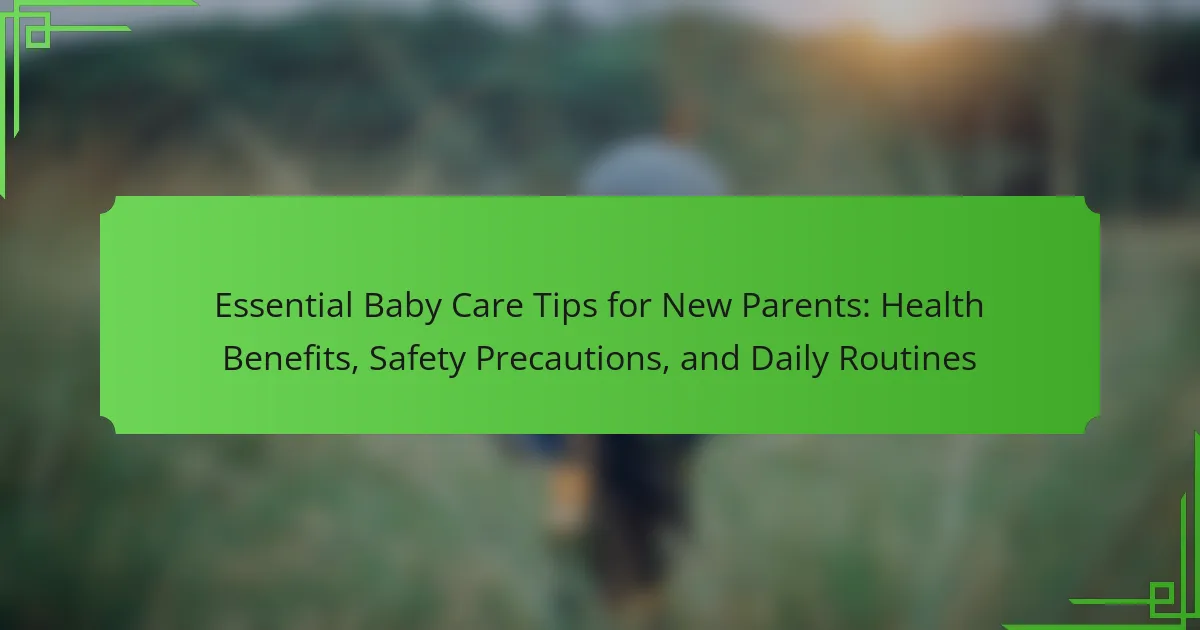Essential baby care tips for new parents focus on three main areas: health benefits, safety precautions, and daily routines. Key recommendations include proper feeding practices, hygiene maintenance, and creating a safe sleeping environment to promote the baby’s well-being. Safety measures such as safe sleep positioning, a smoke-free environment, and the use of appropriate car seats are crucial to prevent risks. Establishing daily routines that include consistent feeding, regular naps, and interactive playtime supports emotional security and physical health. These guidelines are essential for fostering a healthy and safe environment for infants.

What are Essential Baby Care Tips for New Parents?
Essential baby care tips for new parents include ensuring proper feeding, maintaining hygiene, and providing a safe sleeping environment. Parents should breastfeed or use formula as recommended for the baby’s age. Regular diaper changes prevent rashes and discomfort. Bathing should occur a few times a week to maintain cleanliness. Always wash hands before handling the baby to prevent infections. A safe sleep space includes a firm mattress and no loose bedding. Regular pediatric check-ups are crucial for monitoring growth and development. Parents should also observe the baby’s cues for hunger, sleep, and comfort. Following these tips supports the baby’s health and well-being.
Why is baby care important for new parents?
Baby care is crucial for new parents because it directly impacts the infant’s health and development. Proper care ensures that the baby receives adequate nutrition, which is vital for growth. Regular feeding and hygiene practices prevent infections and promote overall well-being. Additionally, attentive baby care fosters emotional bonding between the parent and child. This bond is essential for the baby’s psychological development. Research indicates that infants who receive consistent care show better developmental outcomes. New parents equipped with baby care knowledge can respond effectively to their child’s needs. This responsiveness leads to a secure attachment, which is fundamental for healthy emotional development.
What are the first steps in caring for a newborn?
The first steps in caring for a newborn include ensuring a safe sleeping environment. Place the baby on their back to sleep. Use a firm mattress and avoid soft bedding. Feeding the newborn is crucial for their growth. Breastfeeding is recommended for optimal nutrition. If formula feeding, follow the preparation guidelines carefully. Regularly check the baby’s diaper for wetness or soiling. Change diapers promptly to prevent rashes. Establishing a routine for bathing is important. Use lukewarm water and gentle soap. Skin-to-skin contact promotes bonding and warmth. Monitor the baby’s health by keeping track of their feeding and sleeping patterns.
How can new parents prepare for their baby’s arrival?
New parents can prepare for their baby’s arrival by creating a safe and welcoming environment. This includes setting up a nursery with essential items like a crib, changing table, and storage for baby clothes. Parents should also stock up on supplies such as diapers, wipes, and baby clothes. Attending prenatal classes can provide valuable knowledge about childbirth and newborn care. Additionally, establishing a support system of family and friends is crucial for emotional and practical assistance. Research indicates that being well-prepared reduces stress and improves outcomes for both parents and babies.
What health benefits can proper baby care provide?
Proper baby care provides numerous health benefits. It promotes healthy growth and development in infants. Regular feeding and proper nutrition support weight gain and overall health. Adequate sleep routines enhance cognitive function and emotional regulation. Hygiene practices reduce the risk of infections and illnesses. Responsive caregiving fosters secure attachment and emotional well-being. Regular pediatric check-ups ensure early detection of health issues. Safe sleep practices lower the risk of Sudden Infant Death Syndrome (SIDS). Overall, proper baby care establishes a solid foundation for lifelong health.
How does baby care impact a child’s development?
Baby care significantly impacts a child’s development by influencing their physical, emotional, and cognitive growth. Proper nutrition during infancy supports brain development and physical health. Responsive caregiving fosters secure attachments, which are crucial for emotional stability. Engaging in stimulating activities promotes cognitive skills and language acquisition. Research shows that consistent routines enhance a child’s sense of security and predictability. High-quality baby care can lead to better social skills as children learn to interact with caregivers. Studies indicate that children who receive attentive care are more likely to perform well academically. Overall, effective baby care lays the foundation for lifelong development.
What are the long-term health benefits of early care?
Early care provides significant long-term health benefits for children. It enhances physical, emotional, and cognitive development. Children receiving early care are less likely to experience developmental delays. Research shows that early intervention can improve academic performance later in life. Additionally, early care promotes healthier social skills and emotional regulation. Studies indicate that children in quality early care settings have lower rates of chronic health issues. They often exhibit better mental health outcomes as adults. Overall, early care sets a foundation for lifelong health and well-being.

What safety precautions should new parents take?
New parents should take several safety precautions to ensure their baby’s well-being. First, always place infants on their backs to sleep. This reduces the risk of Sudden Infant Death Syndrome (SIDS). Second, keep the baby’s sleeping area free of soft bedding, pillows, and toys. This helps prevent suffocation hazards. Third, use a properly fitted car seat for every car ride. According to the CDC, car seats reduce the risk of injury by 71-82% in crashes. Fourth, ensure that all baby products meet safety standards. This includes cribs, toys, and clothing. Fifth, maintain a smoke-free environment. Exposure to secondhand smoke increases the risk of respiratory issues. Lastly, supervise the baby during bath time to prevent drowning. Following these precautions significantly enhances infant safety.
How can parents ensure a safe sleeping environment for their baby?
Parents can ensure a safe sleeping environment for their baby by following specific guidelines. Use a firm mattress and avoid soft bedding, such as pillows or blankets. Position the baby on their back to sleep, which reduces the risk of Sudden Infant Death Syndrome (SIDS). Keep the crib free of toys and loose items to prevent suffocation hazards. Maintain a comfortable room temperature, ideally between 68°F to 72°F, to avoid overheating. Ensure the crib meets safety standards set by the Consumer Product Safety Commission (CPSC). Regularly check for recalls on baby products to ensure ongoing safety. Following these practices significantly lowers the risk of sleep-related incidents.
What are the best practices for safe sleep?
The best practices for safe sleep include placing the baby on their back to sleep. This position significantly reduces the risk of Sudden Infant Death Syndrome (SIDS). The sleep surface should be firm and flat, without soft bedding or toys. A fitted sheet is recommended for safety. Room-sharing without bed-sharing is advised, allowing the baby to sleep in the same room as parents. Maintaining a comfortable room temperature can prevent overheating. Parents should avoid exposing the baby to smoke, as it increases SIDS risk. Regular pediatric check-ups can help monitor the baby’s sleep safety. These practices are supported by guidelines from the American Academy of Pediatrics (AAP).
What common hazards should parents be aware of?
Common hazards parents should be aware of include choking hazards, sharp objects, and toxic substances. Choking hazards can be small toys or food items that are not age-appropriate. Sharp objects like knives and scissors should be stored out of reach. Toxic substances include household cleaners and medications that can be harmful if ingested. According to the National Safety Council, unintentional injuries are a leading cause of death for children. Parents must ensure that their environment is safe and free from these hazards to protect their children effectively.
What are essential safety tips for baby-proofing the home?
Essential safety tips for baby-proofing the home include securing furniture and heavy items to prevent tipping. Use safety gates to block stairs and hazardous areas. Install outlet covers to protect against electrical shocks. Keep small objects and choking hazards out of reach. Store cleaning supplies and medications in locked cabinets. Use corner protectors on sharp furniture edges. Ensure that windows are secured with locks or screens. Regularly inspect toys for safety and cleanliness. These measures significantly reduce the risk of accidents in a home with infants or toddlers.
How can parents identify and eliminate potential dangers?
Parents can identify and eliminate potential dangers by conducting regular safety checks in their home. They should inspect common areas for hazards like sharp objects, choking risks, and toxic substances. Parents can also use safety gates to restrict access to dangerous areas. They should secure heavy furniture to walls to prevent tipping. Establishing a clear understanding of emergency procedures is essential. Parents can educate themselves on first aid and CPR for infants. Regularly reviewing child safety resources can enhance awareness. Engaging in open discussions with other parents can provide additional insights into potential risks.
What tools and resources can help with baby-proofing?
Tools and resources for baby-proofing include safety gates, outlet covers, and cabinet locks. Safety gates prevent access to stairs and hazardous areas. Outlet covers protect children from electrical shocks. Cabinet locks keep harmful substances out of reach. Corner guards protect against sharp edges on furniture. Non-slip mats provide stability on slippery surfaces. Baby monitors allow parents to keep an eye on their child from a distance. Childproofing kits offer a comprehensive solution with multiple safety items. These tools significantly reduce the risk of accidents in the home.

What daily routines are beneficial for babies?
Daily routines beneficial for babies include consistent feeding, regular naps, and interactive playtime. Consistent feeding helps establish a healthy eating pattern. Babies typically require feeding every two to three hours. Regular naps contribute to their overall growth and development. Newborns may need up to 16 hours of sleep daily. Interactive playtime fosters cognitive and motor skills. Engaging with toys or reading stimulates their senses. Bathing routines promote hygiene and relaxation. A calm bedtime routine helps signal sleep time. These routines support emotional security and physical health.
How can a consistent feeding schedule benefit a baby?
A consistent feeding schedule benefits a baby by promoting regular hunger cues and improving digestion. This routine helps babies anticipate feeding times, leading to less fussiness. Regular feeding intervals can also support better sleep patterns. Research indicates that babies who are fed on a schedule may experience fewer gastrointestinal issues. Additionally, a structured feeding time enables caregivers to monitor intake more effectively. This can lead to more consistent weight gain, which is crucial during the early months. Overall, a consistent feeding schedule contributes to a baby’s overall health and well-being.
What are the recommended feeding practices for newborns?
Newborns should be exclusively breastfed for the first six months. This practice provides optimal nutrition and immune support. Breast milk contains essential nutrients and antibodies. If breastfeeding is not possible, infant formula is a suitable alternative. Feeding should occur on demand, typically every 2 to 3 hours. Monitoring the baby’s hunger cues is important for timely feeding. Newborns may consume about 1.5 to 3 ounces per feeding during the first weeks. Gradual increases in feeding amounts are expected as the baby grows. Proper feeding practices support healthy growth and development.
How can parents recognize their baby’s hunger cues?
Parents can recognize their baby’s hunger cues through specific behaviors. Common signs include rooting, where the baby turns their head towards a touch on their cheek. Another cue is sucking on their hands or fingers. Crying is a late sign of hunger; it often indicates that the baby is already hungry. Additionally, a baby may become more alert and active when they are hungry. Observing these cues helps parents respond promptly to their baby’s needs. Research indicates that recognizing these cues can lead to better feeding practices and improved infant well-being.
What is the importance of a daily bathing routine?
A daily bathing routine is important for maintaining a baby’s hygiene and skin health. Regular bathing helps remove dirt, sweat, and bacteria from the skin’s surface. It also aids in preventing diaper rash and other skin irritations. Bathing can promote relaxation and improve sleep quality for infants. Additionally, it provides an opportunity for bonding between the parent and the baby. The American Academy of Pediatrics recommends bathing infants two to three times a week, but daily baths can be beneficial for active babies. Overall, a consistent bathing routine supports both physical and emotional well-being in infants.
How often should babies be bathed?
Babies should be bathed about two to three times a week. This frequency helps maintain their hygiene without drying out their sensitive skin. Newborns do not need daily baths as they are not very active and mostly stay clean through regular diaper changes. Pediatricians recommend sponge baths until the umbilical cord stump falls off. After that, parents can transition to tub baths. Overbathing can lead to skin irritation and dryness. Therefore, sticking to a few baths per week is beneficial for a baby’s skin health.
What are the best practices for bathing a newborn?
The best practices for bathing a newborn include using a sponge bath until the umbilical cord falls off. Newborns should be bathed in a warm room to prevent chilling. Use a soft washcloth and mild soap specifically designed for infants. Always support the baby’s head and neck during the bath. Ensure that the water temperature is comfortably warm, around 100°F (37.8°C). Limit bath time to about 5-10 minutes to avoid skin dryness. After the bath, gently pat the baby dry with a soft towel. Finally, keep all bathing supplies within reach to ensure safety and convenience.
What practical tips can help new parents with daily routines?
Establishing a consistent daily routine is crucial for new parents. Start by creating a schedule for feeding, napping, and playtime. This helps the baby feel secure and understand expectations. Use reminders or apps to keep track of these routines. Prioritize self-care by allocating time for rest and personal activities. Involve partners or family members in caregiving tasks to share responsibilities. Prepare baby supplies in advance to streamline daily activities. Keep a flexible mindset to adapt to the baby’s changing needs. Consistency in routines can lead to better sleep patterns for both the baby and parents.
Essential Baby Care Tips for New Parents focuses on critical aspects of infant care, including feeding, hygiene, safe sleep environments, and daily routines. The article emphasizes the health benefits of proper baby care, such as promoting growth and emotional bonding, while also highlighting necessary safety precautions to prevent hazards. Key topics include establishing feeding schedules, recognizing hunger cues, and maintaining a consistent bathing routine. Additionally, the article outlines practical tips for preparing for a baby’s arrival and ensuring a safe home environment, ultimately supporting the overall well-being of both the infant and the parents.
